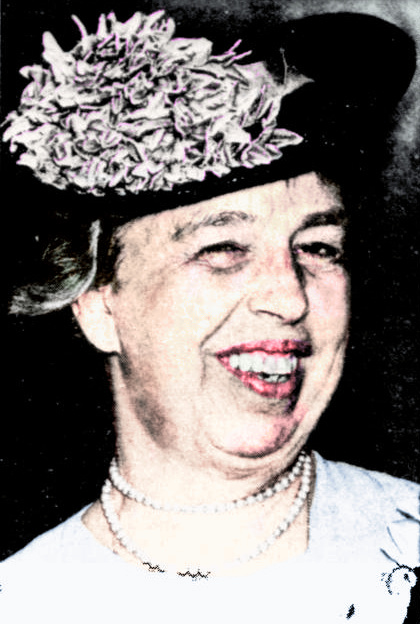
MY DAY
By Eleanor Roosevelt
October 1, 1940
Hyde Park, Monday—
Though it is a gray day today, I have just come in from a ride through the woods, where the colors are becoming more and more beautiful every day. Across our brook there are some trees that have turned a brilliant scarlet, next to them are some deep green pines and a yellow tree. They all reflect in the smooth surface of the water and make a most beautiful picture from the window where I write.
It is curious to be able to sit here and write you about these quiet pleasures, and to have listened to the radio this morning with news of the nightly bombing in London with scarcely a respite before the morning raids began. The British seem to raid quite as often and as steadily, but their objectives do not seem to be entirely concentrated on a city like London, or, as reported this morning, such smaller cities as Aberdeen and Edinburgh.
There seems to be a difference in objectives. On the one hand, the Germans seem to be trying to break the morale of the people by attacking the places where humanity is concentrated. The RAF, on the other hand, seems to put more emphasis on attacking the oil supplies or factories and Channel ports where shipping and supplies may be massed for an effort to land in England. I suppose the Germans make an effort to do this too, but perhaps it is harder to find such scattered objectives.
The English are a curious people. They criticize each other and their government freely in times of peace. They are individualistic as any people in the world, from the duchess who dresses always as the fashions were in her youth, even though she may be 80 years old to the woman who will run a London flat for you and try to run your life as well. She will apparently know all about you and yet never intrude, and will do her job according to its traditions, never doing more nor less than she thinks they require.
Yes, they are an individualistic people, and I don’t think anything could draw them together more solidly and make them act as a unit more surely than continued attack. They have whatever it takes to stand up under long drawn out pressure.
Miss Thompson and I are leaving for a little jaunt into New England. Tonight we will be with our friends, Miss Esther Lape and Miss Elizabeth Read in Connecticut. Tomorrow you will hear from us somewhere along our way, but where we will lay our heads for the night is still in the lap of the gods.